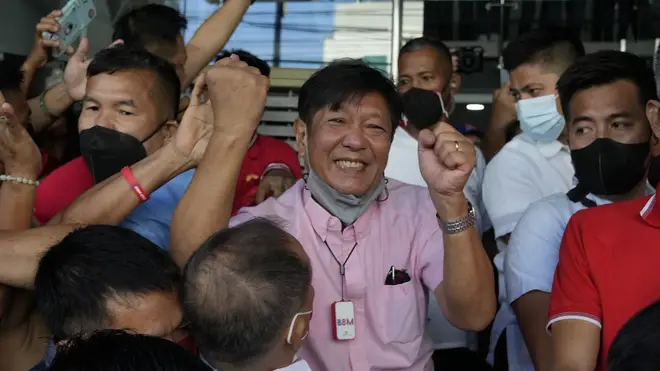
Nick Abbot 10pm - 1am
13 May 2022, 09:24

The son of the late dictator is to return his family to the seat of power.
Allies of presumptive president Ferdinand Marcos Jr are set to dominate both chambers of congress in the Philippines after the apparent triumph of the late dictator’s son in an election.
Ongoing counts from Monday’s vote show they are set to capture most of the 300-seat house of representatives and half of the 24-seat senate that was up for election, in a move that has sparked protests and alarmed commentators and activists.
Their family members and siblings have been also proclaimed winners in local posts, reflecting the strong grip of political dynasties on the south-east Asian democracy despite a constitutional prohibition on such structures that was never enforced.

Jean Franco, a political science professor at the state-run University of the Philippines, said: “It’s going to be problematic because an opposition is very much needed in a democracy.
“There has to be alternative ideas and there has to be monitoring of what the executive is doing – otherwise, we will be like North Korea.”
The electoral triumph of Mr Marcos and his allies is an astonishing reversal of the army-backed but largely peaceful “People Power” revolt in 1986 that forced his father out of office following years of massive human rights atrocities and plunder that his son never acknowledged.
Mr Marcos had more than 31 million votes in the unofficial count in what is projected to be one of the strongest majority mandates for a Philippine president in decades.

His vice-presidential running mate and daughter of the outgoing populist leader, Sara Duterte, also appears to have won with a massive margin.
US President Joe Biden and Chinese President Xi Jinping were among the world leaders who have congratulated them on their huge victory and the relatively smooth conduct of the elections.
The separately elected president and vice president are set to take office on June 30 for a single six-year term after congress confirms the results.
Aside from deciding the fate of the president’s legislative agenda and budget proposal, the Phillipine congress has a crucial oversight role, investigating major government anomalies and deciding on impeachment complaints.

A new anti-terror bill opposed by human rights groups, for example, easily passed in both chambers that were dominated by allies of outgoing president Rodrigo Duterte.
Court cases and legal issues still hound the late dictator’s family, including payment of a huge estate tax, the 2018 corruption conviction of his widow, Imelda Marcos, which is subject to an appeal, and full compensation of thousands of victims of torture, detentions, disappearances and other atrocities committed in the martial-law era when he was in power.
A brutal anti-drug crackdown launched by Mr Duterte, which killed thousands of mostly petty drug suspects, has sparked an investigation by the International Criminal Court as potential crimes against humanity.
The outgoing leader, who is known for his brash language, has said he would likely face more criminal complaints when he steps down on June 30.

Monday’s elections assured the political longevity of both the Marcoses and the Dutertes. A son of the presumptive president, Sandro Marcos, was elected to the House as a representative of their northern home province of Ilocos Norte and several relatives captured provincial posts.
Sara Duterte’s brother, Sebastian Duterte, would succeed her as mayor of southern Davao city. Another brother, Paulo Duterte, has been reelected to another congressional term.
Philippine elections have long been dominated by politicians belonging to the same bloodlines. At least 250 political families have monopolised power across the country, although such dynasties are prohibited under the constitution.
Congress – long controlled by members of powerful clans targeted by the constitutional ban – has failed to pass the law needed to define and enforce the provision.